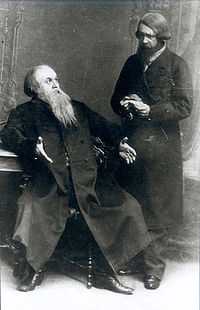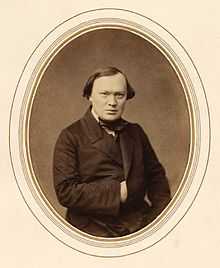It's a Family Affair-We'll Settle It Ourselves
| It's a Family Affair-We'll Settle It Ourselves | |
|---|---|
| Written by | Aleksander Ostrovsky |
| Date premiered | 9 December 1860 |
| Place premiered | Maly Theatre in Moscow |
| Original language | Russian |
| Genre | Comedy |
It's a Family Affair-We'll Settle It Ourselves (Svoi lyudi - sotchtemsya, Свои люди - сочтемся) is a comedy by Alexander Ostrovsky. It was his first major work, written in 1849 and published in the No.6 (March, book 2) 1850 Moskvityanin issue. It was immensely successful and was promptly banned. The play was staged for the first time on 9 December 1860, ten years after its publication. For some time the play has also been referred to as The Bankrupt (its original title).[1]
Background
After his first attempt to write a play, called The Legal Request (Iskovoye proshenuye) failed Ostrovsky started working upon another storyline, again stemming from his experience in the Moscow commercial court. Uncertain in his own potential he invited friend Tertiy Filippov to become a co-author, the latter refused. Then somehow Dmitry Gorev (real surname Tarasenko) emerged, a mystery figure of whom nothing is known besides the fact that he was a son of a merchant who lived not far from Ostrovskys’ (and later turned bankrupt), and who published a drama called Tzar the Liberator or the Poor Orphan in 1843. It was Gorev who suggested that they'd work upon the play together. Several scenes of Act 1 finished, Gorev suddenly refused to continue and left Moscow. He was not seen until 1853 when he re-emerged to accuse Ostrovsky of stealing the text he, Gorev, was co-author of.[2]
History

Ostrovsky was working on The Bankrupt all through 1847 and 1848. By the end of 1849 it has been finished. Ostrovsky's first audience was his University friend Alexey Pisemsky. At this time he met the now famous author Prov Sadovsky who saw the comedy as a revelation and started to recite in Moscow literary circles.[1] In the summer Ostrovsky read the play at Mikhail Katkov's in Merzlyakovsky Lane where another Moscow University professor, I.V.Belyaev was also present. Instantly the author’s got a word-of-mouth reputation in the academic circles.[3] Both Ostrovsky and Sadovsky started to receive invitations to the houses of Moscow cultural elite (Nikolai and Karolina Pavlovy, Alexander Veltman, professors Shevyryov and Pogodin, at Meshchersky's and Sheremetyev's, even in the astronomer A.N.Drashusov's observatory)[4] where they became frequent guests since the autumn of 1849. Ivan Goncharov, who was in Moscow on his way from Petersburg to Simbirsk, has heard the Bankrupt, liked it a lot and recommended Ostrovsky to send the play to Krayevsky's Otechestvennye Zapiski, but the author decided against it, still hoping to get the censorship permission.
In November 1849 Sadovsky read the play at Countess Rostopchina's and she called the play "our Russian Tartuffe" and expressed delight at being the witness to "the birth of our own theatre literature."[5] It was Rastopchina's opinion that made Mikhail Pogodin active in trying to obtain the play and on November 24, 1849 he sent a note to professor Shevyryov asking for his assistance (which he indeed has got) and then asked Nikolai Berg to invite Ostrovsky to his home. On December 3 Ostrovsky read the play to the audience which included Veltman, Lev Mei, the actor Shchepkin and, most notably, Nikolai Gogol. The success was immense[6][7][8][9] although at least one of the guests, Veltman, expressed his reservations, concerning the longevity of the reading.[10]
Publication
The play was finally published in the March (#6) issue of Moskvityanin under the new title It's a Family Affair-We'll Settle It Ourselves. The play in which the uncultured, self-satisfied merchant class was strikingly portrayed, has made Ostrovsky instantly famous in Moscow but soon was banned from being produced on theater stage.[11]
"The Bankrupt caused furor in the city," Moskvityanin editor-in-chief Mikhail Pogodin wrote in a diary on March 20, four days after the #6 of the magazine was issued. Ostrovsky became a star in Moscow overnight. Governor Zakrevsky made a personal effort to support the staging of the play but suddenly the situation worsened. "The Family’s success touched many of the Moscow merchant big cats and it caused indignation of many an influential people. Reports started flying to Petersburg", Modest Pisarev, and actor and Ostrovsky's future publisher wrote. The Theater and Literature Committee banned the play, issuing a report in which it condemned its negativism, pessimism and the lack of "positive examples" even if admitting that it contained nothing that would abuse the censorial rules directly. Nikolai I signed the document and left a note on it, with a question: "Who is this Ostrovsky, the author of Family Affair?" which has prompted one of his aids Count Orlov send a request to the 3rd Department's Moscow office. The secret police promptly maintained surveillance over the author who was still working in the court.[2] In a letter to Russian Minister of Education Ostrovsky admitted the play must have had certain flaws, but added:
According to my idea of fine art's principles I consider the comedy as the best means to achieving moral aims and, seeing myself to be strongest at this way of reproducing life, I felt I had to write - either a comedy or nothing. Being convinced that one's talent is God-given to serve some purpose and that having this talent imposes certain responsibilities... I couldn't let myself remain inactive. For the hour will come when each one will face the question: what have you done with the talent of yours?[2]
Countess Rastopchina passed this text to Gogol. "I find his answer most sensible. God help him in his future work and the ability to express clearer his ideas’ well-meaning so as to dispel all doubts as to that", the later wrote back.[2]
Rather frightened by the official reaction, Ostrovsky has made a visit to Zakrevsky. "This only gives more honour to you", the governor reassured the young author with an unexpected argument. Moscow loved intellectuals persecuted by Petersburg and soon Ostrovsky discovered that this dissident's sheen was making him much more attractive to the local elite. On May 9, 1850, Ostrovsky found himself invited to Gogol's birthday party.[2]
In 1860 Family Affair was finally declared eligible for stage production. This happened only after Ostrovsky has made several changes and the directors of Imperial theaters supported it, giving as a reason (sensibly enough) not the play's virtues but the horrible state of theatrical repertoire. With the ban lifted for that reason, in the early 1861 Family Affair was premiered in Saint Petersburg as Yulia Linskaya's benefice and had immense success. Two weeks later it was staged by Maly Theatre in Moscow, Ostrovsky and the troupe (with Prov Sadovsky as Podkhalyuzin, making a forfeit of reproducing by gesture all those details cut out by the author) were given long ovation and several hundred people followed Ostrovsky and his friends to his house.[2]
References
- ↑ 1.0 1.1 Morozov, P. (1911). "A.M.Ostrovsky biography". Brockhaus and Efron Encyclopedic Dictionary. Retrieved 2012-03-01.
- ↑ 2.0 2.1 2.2 2.3 2.4 2.5 Lakshin, Vladimir (1982). "Alexander Nikolayevich Ostrovsky". Iskusstvo, Moscow. Life in Art series. Retrieved 2012-03-01.
- ↑ Barsukov, N.P. The Life and works of M.P.Pogodin. Vol. 11, p. 68
- ↑ B.Drashusova’s letter to Ostrovsky, Bakhrushin’s Thetare Museum archives, file 200)
- ↑ The Lenin’s Library, fund 231, dpt. 2, 28/41.
- ↑ Berg, I.V. Remembering N.V.Gogol. Russkaya Starina, 1872, N 1, pp. 121-122
- ↑ D.Pogodin. From Memoirs. Countess Rastopchina and her Parties. Istoricheskye Vesti, 1892, N 4, p. 52
- ↑ Berg, Nikolai. Countess Rastopchina in Moscow. Istoricheskye Vesti, 1893, N 3, pp. 707, 708
- ↑ A.N.Ostrovsky and the literary and theatrical scene of XIX-XX centuries. Leningrad, 1974, p. 44-62.
- ↑ A.F.Veltman’s letter to E.I.Krupeninnikova, December 4, 1849. Lenin’s Library, fund 46, dpt II, 1/12).
- ↑ Zhuravlyova, Anna Ivanovna (1990). "Alexander Nikolayevich Ostrovsky". Russian Writers. Biobliography dictionary. Ed. P.A.Nikolayev. Prosveshchenye. Retrieved 2012-03-01.
| ||||||||
